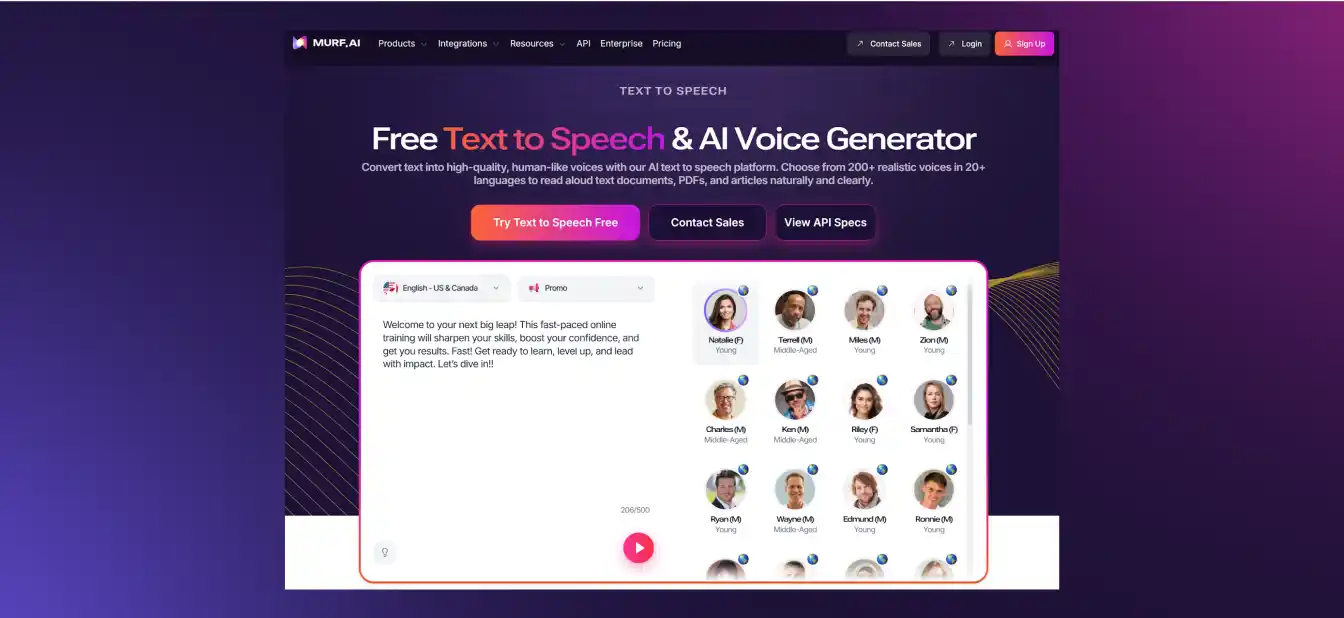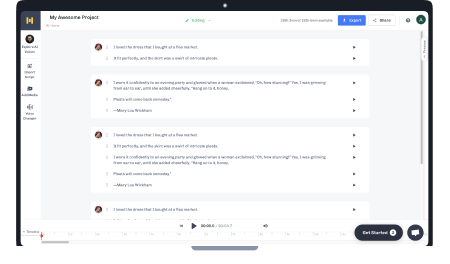Top 10 Luvvoice Alternatives for 2026
.webp)
Luvvoice is a popular text-to-speech (TTS) solution that offers over 200 AI voices across 70+ languages. It also allows professionals to clone their voice to retain a personal touch, which is useful for maintaining engagement.
However, it has some limitations. For instance, the AI voice generator can only export in MP3 and stores generated audio tracks on the cloud for 72 hours, even for premium tiers. Additionally, there isn't much customization to tweak the voice quality.
Therefore, creators and business teams need to consider alternatives to Luvvoice that give them the freedom to produce natural-sounding audio based on their needs.
In this article, let's look at ten text-to-speech software that can replace Luvvoice in content creation workflows.
10 Best Luvvoice Alternatives for 2026
1. Murf AI

Best for: Quickly generating lifelike voiceovers and dubbing for content creators, e-learning instructors, and business teams.
Key features:
- 200+ multilingual AI voices
- Voice cloning and AI dubbing
- Pitch, speed, emphasis control, pronunciation library
- Text-to-speech API
- Team workspaces & enterprise integrations
Strengths:
- Natural, human-sounding speech
- Broad language & accent support
- Fine-tuning controls,
- Integration with popular tools
- Scalable, robust, and cost-effective API
- Team collaboration features
Limitations:
- Voice cloning is restricted to higher (Enterprise) tiers
- Free plan allows limited output and download
Pricing: Premium tiers start at $19/month, billed annually
Murf AI is the best Luvvoice replacement with its ultra-realistic, emotionally rich AI voices that can generate audio in 20+ languages, streamlining multilingual content creation. The voice cloning feature is quite intuitive, making it easier for non-technical stakeholders to produce audio files effectively.
Teams can modify pitch, tone, and speed to create custom voices that boost engagement across content types, such as audiobooks and YouTube videos. Advanced features like AI dubbing can translate existing audio tracks seamlessly for a global audience.
This Luvvoice competitor offers built-in integrations to enterprise solutions like Canva, Adobe Captivate, and Google Slides, allowing users to hit the ground running.
2. VEED
.webp)
Best for: Browser-based, AI-assisted video editing for creators and brands
Key features:
- AI avatars and voice cloning
- Multimedia editing
- Screen and webcam recording
- Auto subtitles & transcripts
- Collaborative editing mode
Strengths:
- Easy to use with intuitive interface
- Team collaboration & review workflows
Limitations:
- Free plan watermarks & lower export quality
- Performance lag with large files
Pricing: Premium tiers start at $12/user/month, billed annually
VEED is a comprehensive video editing solution with robust text-to-speech capabilities. Creators and content teams can create engaging videos and audio tracks in one collaborative workspace. This tool, due to its multimedia capabilities, can be effective for marketing teams and training content creators.
This platform goes a step beyond generating voiceovers with AI avatars. These avatars act as virtual educators or presenters, boosting audience knowledge retention. The solution also features an AI playground, where users can experiment with various TTS models before choosing the one that fits their use case.
3. NaturalReader
.webp)
Best for: Conversion of written text into natural-sounding speech for listening, learning, and basic voiceovers.
Key features:
- Wide multilingual & neural voices with cloning
- Pronunciation editor and speed, pause, volume controls
- Supports PDFs, Word, EPUB, OCR (image → text)
- Multiple voices in the same document
Strengths:
- Cross-platform support
- Commercial licensing options
Limitations:
- Occasional unnatural prosody and cadence with complex text
- Voice choices are limited compared to other tools
Pricing: Premium tiers start at $49/month, billed annually
NaturalReader, as the name suggests, generates ultra-realistic AI voiceovers for long-form text content, such as PDFs, e-books, and webpages. The tool is effective for enhancing accessibility for physically challenged individuals and boosting productivity for busy professionals.
Commercially, the platform is useful for learning applications, such as creating audiobooks and support content for customers. Additionally, it allows export in AAC format, elevating the listening experience.
4. Descript
.webp)
Best for: Editing audio and video in a transcript and generating AI audio tracks
Key features:
- Voice cloning and overdubbing
- AI editing features like filler word removal and pause shortener
- Collaboration & versioning
- One-click upload to YouTube and other channels
Strengths:
- Intuitive UI, accelerating adoption
- Lowers barrier for non-editors, powerful AI tools
Limitations:
- Transcription errors (especially names, accents, overlaps),
- Performance and stability issues on large or complex projects
Pricing: Premium tiers start at $16/month, billed annually
Descript is a text-to-speech solution that can convert scripts into natural-sounding audio tracks. Businesses can clone their voice in minutes or choose from 20 diverse voices catering to listeners across the world.
On top of that, it's a complete video editing tool where professionals can edit content right in the script, rather than the timeline. This streamlined approach makes it suitable for non-technical stakeholders who can easily polish video content with subtitles, images, or other video overlays.
5. Colossyan
.webp)
Best for: Converting scripts or documents into avatar-narrated videos
Key features:
- AI and personalized avatars
- Seamless text-to-video workflow
- Automatic translation and localization
- PPT, PDF, etc., import
- Team collaboration features
Strengths:
- Fast video generation and rendering
- Reliable localization and multilingual support
Limitations:
- Fewer avatar customization options
- Less content customization capabilities
Pricing: Premium tiers start at $19/month, billed annually
Colossyan is an AI video generator with robust TTS capabilities that provide lifelike voiceovers for podcasts, learning materials, and other types of multimedia content. Content teams can choose from 600+ voices and create audio tracks in over 100 languages and dialects.
Like other solutions on this list, teams can use this Luvvoice replacement to customize the voice on a granular level, making the platform suitable for various projects.
6. Speechelo
.webp)
Best for: Quick AI voice generation from text for growing brands
Key features:
- 30+ voices, multi-language & accent support,
- Various tone options (e.g., normal, joyful, serious)
- Breathing & pause insertion
Strengths:
- One-time payment option available
- Compact tool for basic voiceover needs
Limitations:
- Voices can sound robotic or less expressive at times
- Fewer voice customization options
Pricing: Premium tiers start at $19.99 per month
Speechelo is a lightweight, minimalistic text-to-speech tool for growing brands. The technology ensures fast and qualitative output in 30+ human-like voices, available in over 35 languages. Its integrated AI engine automatically inserts punctuation in unformatted text, enabling users to focus on content creation.
While it may not be as feature-rich as other options, Speechelo makes a difference by being very cost-effective. The solution has a one-time payment plan, fitting every budget and maximizing long-term ROI.
7. Microsoft Azure Text-to-Speech
.webp)
Best for: Enterprise-grade scalable speech synthesis integrated into apps & services
Key features:
- Custom brand voice creation
- Robust REST APIs & SDKs, batch synthesis
- Real-time streaming
Strengths:
- High voice quality & naturalness
- Seamless integration with other Microsoft Azure services
Limitations:
- Can become costly at large scale
- Steep learning curve for advanced features
Pricing: Custom; based on enterprise needs
Microsoft Azure Text-to-Speech can be a perfect option for established enterprises with large-scale requirements. The tool can generate studio-quality neural voices in 140 languages while enabling professionals to create custom voice models for ideal results.
Moreover, developers can leverage its API for real-time TTS applications, such as multilingual customer support and live video translation. This tool is a great find for businesses using or planning to use the Microsoft Azure ecosystem for seamless integration.
8. Amazon Polly
.webp)
Best for: Scalable, developer-friendly speech synthesis
Key features:
- Plenty of standard, neural, long-form & generative voices
- Custom lexicons and accent support
- Multi-language & localization support
- Easier integration with other AWS services (e.g., Amazon Connect)
Strengths:
- High quality, natural speech (especially neural voices)
- Deep customization via SSML & lexicons
Limitations:
- Cost can add up at high volume
- Quota and throttling limits
Pricing: Custom; based on enterprise needs
Amazon Polly is another top runner for large global brands searching for a powerful TTS solution with real-time API capabilities. While this Luvvoice alternative supports fewer languages (40+) compared to Microsoft's offering, it makes up for it in pricing.
Teams can generate an AI voice from 5 million characters in standard quality and 1 million characters in neural (premium) quality for completely free.
9. Speechify
.webp)
Best for: Students, professionals, and users to listen to written text on the go.
Key features:
- 200+ voices, multilingual support
- Browser, mobile apps, and web extensions
- Offline listening
Strengths:
- Support for scanning printed text (OCR)
- Enhances accessibility for text-based content
Limitations:
- Free and basic voices sound robotic and are prone to mispronunciations
- Limited developer and enterprise API access
Pricing: Premium tiers start at $11.58/month, billed annually
Speechify converts long-form text content, such as e-books, web articles, and PDFs, into engaging audio tracks. It is an effective e-learning tool that offers over 200 AI voices across 30+ languages, catering to a global audience.
Interestingly, professionals can generate audio in a celebrity's voice to deliver unique experiences to their listeners, even on live applications via API. This can help companies stand out in terms of their customer-facing marketing content.
10. Lovo.ai
.png)
- Best for: E-learning, marketing, and creative content teams
- Key features:
- 500+ AI voices in 100+ languages
- Voice cloning with emotional, expressive controls
- Online video editor and subtitle generator,
- Team collaboration capabilities
- Strengths:
- Realistic and human-like quality (especially with advanced voices)
- Integrated multimedia editor
- Limitations:
- Pricing can be high for heavier users
- Commercial rights available in paid tiers only
- Pricing: Premium tiers start at $24/month, billed annually
Lovo.ai, accessible through Genny platform, can produce AI voices in 500+ styles in over 100 languages. It can be useful for businesses serving different demographics for creating content like podcasts and audiobooks.
Teams can export content in multiple formats, such as MP3, WAV, and MP4. The voice cloning tool can be helpful for content creators to accelerate their creative workflows. As usual, professionals can customize the output based on pitch, speed, and emphasis.
How to Select the Right Luvvoice Competitor
Decision-makers might get confused with so many potentially good options. Testing each of them can be time-consuming. Here’s a simple framework that will help businesses narrow their search:
- Emotional expressiveness and voice variety: Teams can produce audio content for diverse audiences across platforms.
- Customization and audio editing tools: Users can manually optimize the tone, speed, pitch, and pronunciation to get as realistic an output as possible in the desired format.
- Integrations and API/SDK support: This helps developers bring TTS capabilities into workflows like customer support.
- Long-term scalability and ROI: Needs fluctuate over time, and the tool should remain cost-effective throughout the changes. Platforms that charge based on usage are better in this regard.
Murf AI: The Ideal Luvvoice Alternative
Murf AI’s TTS solution fares better than Luvvoice in voice quality, versatility, scalability, and cost-effectiveness.
The platform offers the best-in-industry audio generation that captures the full range of human emotion. Then, 120+ voices in 20+ languages and dialects make it useful in almost any audio content creation workflow.
Our API will bring the top voice generation models to custom business processes, such as customer support and e-learning. Finally, the pricing is simple and transparent, and is based on usage to ensure the users don’t overpay.
Ready to transform voice creation in your organization?
Sign up today and get 10 minutes of free voice generation.

Frequently Asked Questions
Is Luvvoice the best TTS platform in the market?
.svg)
No. While Luvvoice is easy to use and free, it lacks advanced customization, enterprise-grade support, and reliability. Alternatives like Murf AI, Microsoft Azure, or Amazon Polly provide stronger voice quality, integrations, and scalability for professional use cases.
What is the perfect Luvvoice replacement for businesses and enterprises?
.svg)
Murf AI is often the best fit for enterprises, thanks to its professional voice quality, robust API support, and team collaboration features. For larger-scale deployments, Microsoft Azure and Amazon Polly offer unmatched reliability, global availability, and enterprise security compliance.
How to choose the right TTS solution?
.svg)
Look at factors like natural voice variety, emotional expressiveness, and customization tools. Assess integrations with your existing systems and ensure the platform supports long-term scalability. Consider pricing and ROI to ensure the solution fits both current and future needs.
Which Luvvoice alternative offers the most realistic AI voices?
.svg)
Murf AI and Lovo.ai consistently receive top ratings for lifelike, expressive AI voices. Speechify also offers premium voice options with natural pacing and tone. These platforms surpass Luvvoice by delivering higher-quality voices with better customization and production-ready polish.















